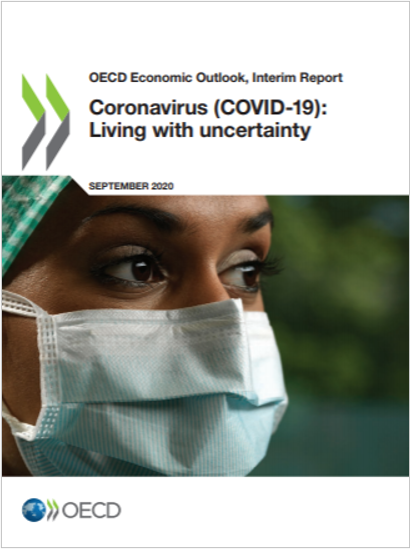Coronavirus (COVID-19): Living with uncertainty
After an unprecedented collapse in the first half of the year, economic output recovered swiftly following the easing of containment measures and the initial re-opening of businesses, but the pace of recovery has lost some momentum more recently.
Global output collapsed in the first half of 2020 as the COVID-19 pandemic took hold, with declines of more than one-fifth in some advanced and emerging-market economies. Without the prompt and effective policy support introduced in all economies, the contraction in output would have been substantially larger. Output picked up swiftly following the easing of confinement measures and the initial re-opening of businesses, but the pace of the global recovery has lost some momentum over the summer months.
- Household spending on many durable goods has bounced back relatively quickly, but spending on services, especially those requiring close proximity between workers and consumers or international travel, has remained subdued.
- Hours worked have fallen significantly everywhere, but government support schemes have helped to maintain household incomes.
- Corporate investment and international trade remain weak, holding back the pick-up in manufacturing production in many export-oriented economies.
The outlook is subject to considerable uncertainty and projections are dependent on assumptions about the spread of the COVID-19 virus and policy developments.
- The projections assume that sporadic local outbreaks will continue, with these being addressed by targeted local interventions rather than national lockdowns; a vaccination is assumed not to become widely available until late in 2021.
- Global GDP is projected to decline by 4½ per cent this year, before picking up by 5% in 2021. The drop in global output in 2020 is smaller than expected, though still unprecedented in recent history, but this masks considerable differences across countries, with upward revisions in China, the United States and Europe, but weaker-than-expected outcomes in India, Mexico and South Africa.
- In most economies, the level of output at the end of 2021 is projected to remain below that at the end of 2019, and considerably weaker than projected prior to the pandemic, highlighting the risk of long-lasting costs from the pandemic.
- If the threat from the coronavirus fades more quickly than expected, improved confidence could boost global activity significantly in 2021. However, a stronger resurgence of the virus, or more stringent containment measures, could cut 2-3 percentage points from global growth in 2021, with higher unemployment and a prolonged period of weak investment.
Fiscal, monetary and structural policy support needs to be maintained to preserve confidence and limit uncertainty, but evolve with underlying economic conditions.
- Many central banks have appropriately announced further policy easing in the past three months and changes in policy frameworks are being rightly introduced to convince investors that policy rates will be kept low for a long time.
- Fiscal policy support needs to be pursued in 2021 and recent announcements in many countries of additional fiscal measures are welcome; the aim must be to avoid premature budgetary tightening at a time when economies are still fragile.
- The maintenance of strong fiscal support should not prevent necessary adjustments to key emergency programmes – including job retention schemes, and income support measures - to limit long-lasting costs from the crisis and encourage the needed reallocation of resources towards expanding sectors.
- Enhanced global co-operation to maintain open borders and the free flow of trade, investment and medical equipment is essential to mitigate and suppress the virus in all parts of the world and speed up the economic recovery.
OECD Sett 2020
Collegati




















